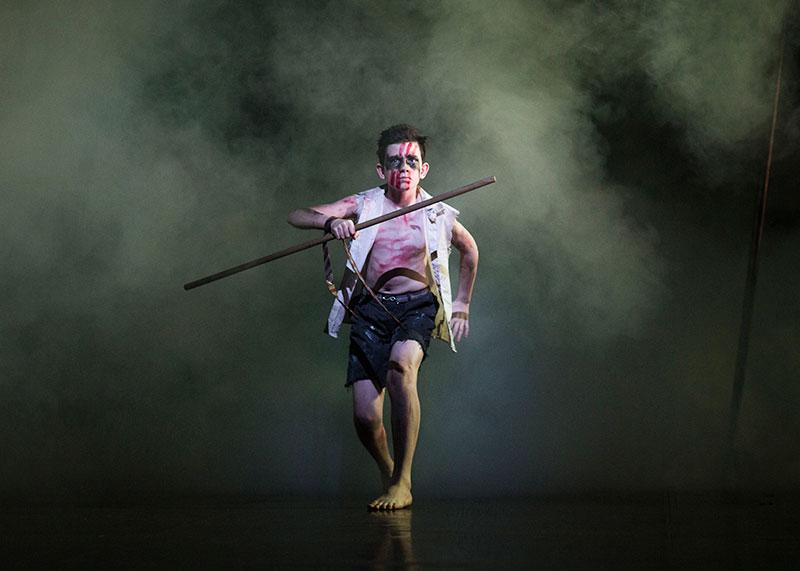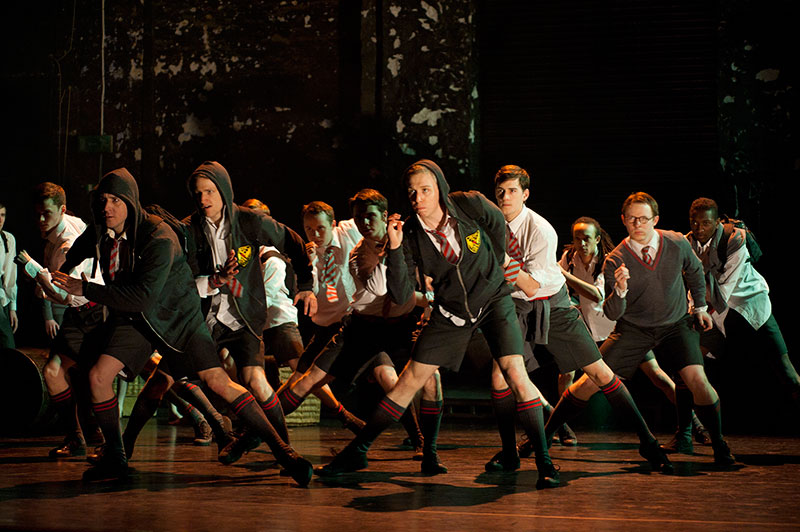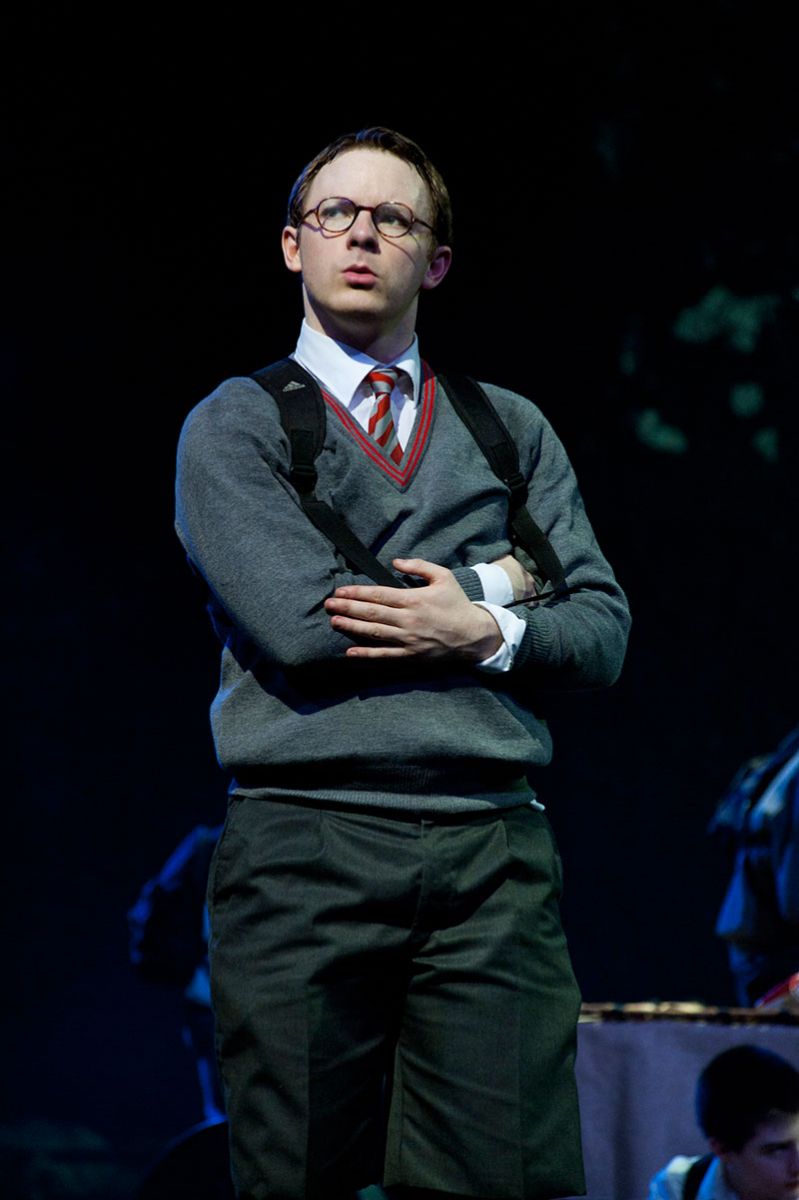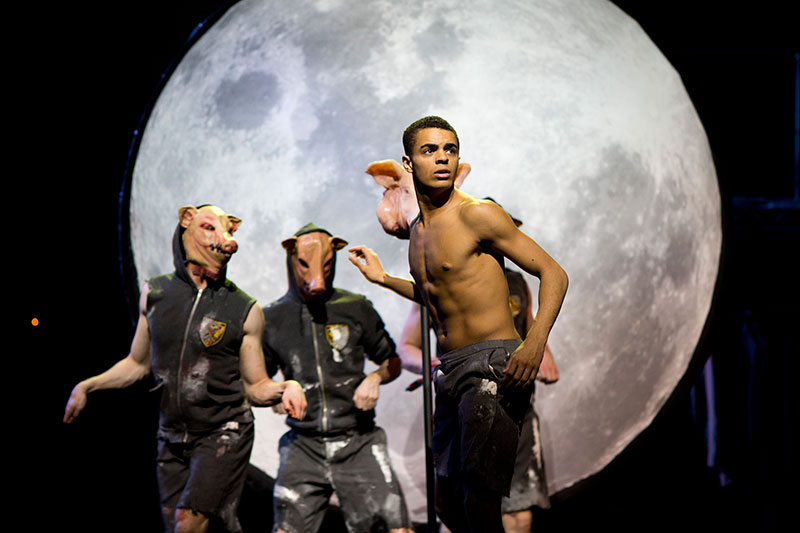Lord of the Flies, Matthew Bourne's New Adventures, Sadler's Wells | reviews, news & interviews
Lord of the Flies, Matthew Bourne's New Adventures, Sadler's Wells
Lord of the Flies, Matthew Bourne's New Adventures, Sadler's Wells
Golding's tale of schoolboy savagery becomes superb dance theatre, with real schoolboys

New Adventures, the name of Matthew Bourne's company, has a ruddy-cheeked, Boys’ Own ring to it that has – until now – been rather belied by his oeuvre, which includes a dance version of Edward Scissorhands, as well as dark retellings of all the traditional story ballets.
Civilization and barbarism are complex terms, and political philosophers of a pessimistic cast – most prominently Jean-Jacques Rousseau – have been at pains to point out that so-called civilized people, with all their art and technology, are potentially a lot more barbaric than tribal societies on desert islands. The arts and sciences are a double-edged sword, just as capable of driving degeneration as of exalting or refining – something Golding makes clear in his novel, where advances in technology (sharpening sticks, levering rocks) are just as deadly as night terrors and collective hysteria. Yet just by writing the novel, Golding also offers a more hopeful view of the value of art to instruct and improve human nature. Matthew Bourne, one of Britain’s most accomplished and intelligent makers of dance theatre, has met this challenge to art head-on, not only setting his version of the story in a deserted theatre, but engaging modern schoolboys to act and dance in it.
 The other that “civilized” adults in Britain demonise is often young and male: the hoodie, the disaffected yoof, the London rioter of 2012, the knife-wielding gang member. Bourne challenges those stereotypes by mounting an incredibly impressive, powerful, professional dance show using a cast of 20-plus local boys and young men chosen by audition in each city the tour visits. These amateur casts give fantastic performances, merging seamlessly with the small group of professional dancers playing the main parts, and amply demonstrate the ability of young men to be just as disciplined and professional as anyone else.
The other that “civilized” adults in Britain demonise is often young and male: the hoodie, the disaffected yoof, the London rioter of 2012, the knife-wielding gang member. Bourne challenges those stereotypes by mounting an incredibly impressive, powerful, professional dance show using a cast of 20-plus local boys and young men chosen by audition in each city the tour visits. These amateur casts give fantastic performances, merging seamlessly with the small group of professional dancers playing the main parts, and amply demonstrate the ability of young men to be just as disciplined and professional as anyone else.
They also look like they’re having a fabulously good time on stage, and if the 6000-odd men and boys who have taken part in the impressive programme of workshops that has accompanied this tour have enjoyed their experience of dance and storytelling even half as much, Bourne and his collaborators have done a really fantastic thing for dance outreach.
 But all the worthiness in the world doesn’t guarantee a good show – so I am pleased to report that more or less none of the above was passing through my head during the performance last night. It is, quite simply, fabulous theatre: gripping from first to last, exciting, highly affecting (I cried), and unforgettable. No need to have read the novel: it’s all there in dance. We meet chubby, bespectacled Piggy (Sam Plant, pictured left), Ralph (Sam Archer), the good leader, handsome but wavering, the bad chief Jack (Danny Reubens) as a swaggering hoodie (nice touch), and the rest in their neat school uniforms, and watch with mounting horror as factions emerge and become increasingly violent.
But all the worthiness in the world doesn’t guarantee a good show – so I am pleased to report that more or less none of the above was passing through my head during the performance last night. It is, quite simply, fabulous theatre: gripping from first to last, exciting, highly affecting (I cried), and unforgettable. No need to have read the novel: it’s all there in dance. We meet chubby, bespectacled Piggy (Sam Plant, pictured left), Ralph (Sam Archer), the good leader, handsome but wavering, the bad chief Jack (Danny Reubens) as a swaggering hoodie (nice touch), and the rest in their neat school uniforms, and watch with mounting horror as factions emerge and become increasingly violent.
We see the boys capering wildly with glee at first, then shivering with fear: their descent into savagery is genuinely discomfiting, as - casting off their uniforms - they rampage noisily over the stage, grunting and shouting, holding up a severed pig’s head that glistens redly. Terry Davies's score is a mix of melody and noise that echoes and illustrates the warring of good and bad in human nature: angelic choirboys contrast with squawks and grunts, cello elegies with thumping bass and insistent drumming.
 Bourne fans looking for the polished choreography and dance finesse of his Swan Lake won’t find quite the same thing here: though some of the professional dancers give gorgeous, haunting solos (especially Layton Williams as Simon, pictured right), Bourne has chosen to match the nature of both cast and story with a more naturalistic movement language, using running, and stamping, with a bit of B-boy flair thrown in. It’s executed tremendously well by all, and there is huge power and confidence in the two contrasting ensemble numbers that show the boys’ descent - one at the beginning based on neat, cadet-like marching and accompanied by the sound of boy trebles, and a later one based on heavy, threatening stamping, and accompanied by a soundtrack of grunts and animal noises.
Bourne fans looking for the polished choreography and dance finesse of his Swan Lake won’t find quite the same thing here: though some of the professional dancers give gorgeous, haunting solos (especially Layton Williams as Simon, pictured right), Bourne has chosen to match the nature of both cast and story with a more naturalistic movement language, using running, and stamping, with a bit of B-boy flair thrown in. It’s executed tremendously well by all, and there is huge power and confidence in the two contrasting ensemble numbers that show the boys’ descent - one at the beginning based on neat, cadet-like marching and accompanied by the sound of boy trebles, and a later one based on heavy, threatening stamping, and accompanied by a soundtrack of grunts and animal noises.
I could go on and on – about the cleverness of the theatre set, with its use of costume rails as thickets for Ralph and Piggy to hide behind, about the fantastic acting of the lead parts, about the literal coup de théâtre that kills Piggy. But I simply urge you to go and see for yourself. Bourne has done it again: this is dance theatre at its intelligent, powerful, moving best, and a resounding argument for the power of art to bring out the better side of human nature.
- Lord of the Flies is at Sadler's Wells till 11 October, then touring to Cardiff, Newcastle, Norwich and Bradford.
rating
Explore topics
Share this article
The future of Arts Journalism
You can stop theartsdesk.com closing!
We urgently need financing to survive. Our fundraising drive has thus far raised £49,000 but we need to reach £100,000 or we will be forced to close. Please contribute here: https://gofund.me/c3f6033d
And if you can forward this information to anyone who might assist, we’d be grateful.

Subscribe to theartsdesk.com
Thank you for continuing to read our work on theartsdesk.com. For unlimited access to every article in its entirety, including our archive of more than 15,000 pieces, we're asking for £5 per month or £40 per year. We feel it's a very good deal, and hope you do too.
To take a subscription now simply click here.
And if you're looking for that extra gift for a friend or family member, why not treat them to a theartsdesk.com gift subscription?
more Dance
 'We are bowled over!' Thank you for your messages of love and support
Much-appreciated words of commendation from readers and the cultural community
'We are bowled over!' Thank you for your messages of love and support
Much-appreciated words of commendation from readers and the cultural community
 iD-Reloaded, Cirque Éloize, Marlowe Theatre, Canterbury review - attitude, energy and invention
A riotous blend of urban dance music, hip hop and contemporary circus
iD-Reloaded, Cirque Éloize, Marlowe Theatre, Canterbury review - attitude, energy and invention
A riotous blend of urban dance music, hip hop and contemporary circus
 How to be a Dancer in 72,000 Easy Lessons, Teaċ Daṁsa review - a riveting account of a life in dance
Michael Keegan-Dolan's unique hybrid of physical theatre and comic monologue
How to be a Dancer in 72,000 Easy Lessons, Teaċ Daṁsa review - a riveting account of a life in dance
Michael Keegan-Dolan's unique hybrid of physical theatre and comic monologue
 A Single Man, Linbury Theatre review - an anatomy of melancholy, with breaks in the clouds
Ed Watson and Jonathan Goddard are extraordinary in Jonathan Watkins' dance theatre adaptation of Isherwood's novel
A Single Man, Linbury Theatre review - an anatomy of melancholy, with breaks in the clouds
Ed Watson and Jonathan Goddard are extraordinary in Jonathan Watkins' dance theatre adaptation of Isherwood's novel
 Peaky Blinders: The Redemption of Thomas Shelby, Rambert, Sadler's Wells review - exciting dancing, if you can see it
Six TV series reduced to 100 minutes' dance time doesn't quite compute
Peaky Blinders: The Redemption of Thomas Shelby, Rambert, Sadler's Wells review - exciting dancing, if you can see it
Six TV series reduced to 100 minutes' dance time doesn't quite compute
 Giselle, National Ballet of Japan review - return of a classic, refreshed and impeccably danced
First visit by Miyako Yoshida's company leaves you wanting more
Giselle, National Ballet of Japan review - return of a classic, refreshed and impeccably danced
First visit by Miyako Yoshida's company leaves you wanting more
 Quadrophenia, Sadler's Wells review - missed opportunity to give new stage life to a Who classic
The brilliant cast need a tighter score and a stronger narrative
Quadrophenia, Sadler's Wells review - missed opportunity to give new stage life to a Who classic
The brilliant cast need a tighter score and a stronger narrative
 The Midnight Bell, Sadler's Wells review - a first reprise for one of Matthew Bourne's most compelling shows to date
The after-hours lives of the sad and lonely are drawn with compassion, originality and skill
The Midnight Bell, Sadler's Wells review - a first reprise for one of Matthew Bourne's most compelling shows to date
The after-hours lives of the sad and lonely are drawn with compassion, originality and skill
 Ballet to Broadway: Wheeldon Works, Royal Ballet review - the impressive range and reach of Christopher Wheeldon's craft
The title says it: as dancemaker, as creative magnet, the man clearly works his socks off
Ballet to Broadway: Wheeldon Works, Royal Ballet review - the impressive range and reach of Christopher Wheeldon's craft
The title says it: as dancemaker, as creative magnet, the man clearly works his socks off
 The Forsythe Programme, English National Ballet review - brains, beauty and bravura
Once again the veteran choreographer and maverick William Forsythe raises ENB's game
The Forsythe Programme, English National Ballet review - brains, beauty and bravura
Once again the veteran choreographer and maverick William Forsythe raises ENB's game
 Sad Book, Hackney Empire review - What we feel, what we show, and the many ways we deal with sadness
A book about navigating grief feeds into unusual and compelling dance theatre
Sad Book, Hackney Empire review - What we feel, what we show, and the many ways we deal with sadness
A book about navigating grief feeds into unusual and compelling dance theatre
 Balanchine: Three Signature Works, Royal Ballet review - exuberant, joyful, exhilarating
A triumphant triple bill
Balanchine: Three Signature Works, Royal Ballet review - exuberant, joyful, exhilarating
A triumphant triple bill

Add comment